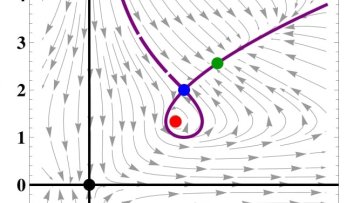15:00
Cryptanalysis of the Algebraic Eraser
Abstract
The Algebraic Eraser is a cryptosystem (more precisely, a class of key
agreement schemes) introduced by Anshel, Anshel, Goldfeld and Lemieux
about 10 years ago. There is a concrete instantiation of the Algebraic
Eraser called the Colored Burau Key Agreement Protocol (CBKAP), which
uses a blend of techniques from permutation groups, matrix groups and
braid groups. SecureRF, the company owning the trademark to the
Algebraic Eraser, is marketing this system for lightweight
environments such as RFID tags and other Internet of Things
applications; they have proposed making this scheme the basis for an
ISO RFID standard.
This talk gives an introduction to the Algebraic Eraser, a brief
history of the attacks on this scheme using ideas from group-theoretic
cryptography, and describes the countermeasures that have been
proposed. I would not recommend the scheme for the proposed
applications: the talk ends with a brief sketch of a recent convincing
cryptanalysis of this scheme due to Ben-Zvi, Blackburn and Tsaban
(which appeared at CRYPTO this summer), and significant attacks
on the protocol in the proposed ISO standard due to Blackburn and
Robshaw (which appeared at ACNS earlier this year).
There is a wide class of problems in mathematics known as inverse problems. Rather than starting with a mathematical model and analysing its properties, mathematicians start with a set of properties and try to obtain mathematical models which display them. For example, in mathematical chemistry researchers try to construct chemical reaction systems that have certain predefined behaviours. From a mathematical point of view, this can be used to create simplified chemical systems that can be used as test problems for different mathematical fields.
Correctly predicting extinction is critical to ecology. Claim extinction too late, and you may be taking resources away from a species that actually could be saved. Claim extinction too early, and you may cause the true extinction due to stopping resources, such as removing protection of its habitat.
Alison Etheridge FRS, Professor of Probability in the University of Oxford, has been named Fellow of the Institute of Mathematical Statistics (IMS). Professor Etheridge received the award for outstanding research on measure-valued stochastic processes and applications to population biology; and for international leadership and impressive service to the profession.
The geometry of constant mean curvature surfaces in Euclidean space
Abstract
In this talk I will begin by reviewing classical geometric properties of constant mean curvature surfaces, H>0, in R^3. I will then talk about several more recent results for surfaces embedded in R^3 with constant mean curvature, such as curvature and radius estimates. Finally I will show applications of such estimates including a characterisation of the round sphere as the only simply-connected surface embedded in R^3 with constant mean curvature and area estimates for compact surfaces embedded in a flat torus with constant mean curvature and finite genus. This is joint work with Meeks.
Inaugural Roger Penrose Lecture - Stephen Hawking CANCELLED
Abstract
In recognition of a lifetime's contribution across the mathematical sciences, we are initiating a series of annual Public Lectures in honour of Roger Penrose. The first lecture will be given by his long-time collaborator and friend Stephen Hawking.
Registration will open at 10am on 4 January 2017. Please email:
@email from that time only.
When registering please give your name and affiliation - your position, department & organisation/institution as appropriate. Or if you are a member of the General Public, please say so. Places will be allocated on a first come, first served basis with only one place per person. We will only be able to respond if you have a place or are on the waiting list.
We will be podcasting the lecture live. More details to follow.
Fashion, Faith, and Fantasy in the New Physics of the Universe - Roger Penrose SOLD OUT
Abstract
What can fashionable ideas, blind faith, or pure fantasy have to do with the scientific quest to understand the universe? Surely, scientists are immune to trends, dogmatic beliefs, or flights of fancy? In fact, Roger Penrose argues that researchers working at the extreme frontiers of mathematics and physics are just as susceptible to these forces as anyone else. In this lecture, based on his new book, Roger will argue that fashion, faith, and fantasy, while sometimes productive and even essential, may be leading today's researchers astray, most notably in three of science's most important areas - string theory, quantum mechanics, and cosmology. Yet Roger will also describe how fashion, faith, and fantasy have, ironically, also been invaluable in shaping his own work.
Roger will be signing copies of his book after the lecture.
This lecture is now SOLD OUT. Any questions, please email: @email
Parabolic problems with critical growth
Abstract
I will discuss on the existence and regularity results for the heat flow of the so called H-systems and for more general parabolic p-laplacian problems with critical growth.
The Calderón problem for the fractional Laplacian
Abstract
We show global uniqueness in an inverse problem for the fractional Schrödinger equation: an unknown potential in a bounded domain is uniquely determined by exterior measurements of solutions. We also show global uniqueness in the partial data problem where the measurements are taken in an arbitrary open subset of the exterior. The results apply in any dimension $\geq 2$ and are based on a strong approximation property of the fractional equation that extends earlier work. This special feature of the nonlocal equation renders the analysis of related inverse problems radically different from the traditional Calderón problem. This is a joint work with T. Ghosh (HKUST) and G. Uhlmann (Washington).




